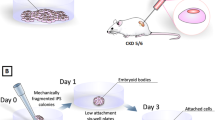Abstract
We previously showed that mesenchymal stem cells (MSCs) can differentiate into a functional miniature kidney, suggesting that MSCs may be a cell source for kidney regeneration. However, MSCs from long-term dialysis patients, which have been exposed to uremic toxin, can exhibit reduced viability. Therefore, the aim of this study was to examine the gene expression profiles and differentiation capabilities of bone marrow- and adipose-derived MSCs from chronic kidney disease (CKD) model rats. CKD was induced in rats by adenine feeding, and then MSCs were isolated from bone marrow (BMSCs) and adipose tissue (ASCs). After confirming MSC surface marker expression, comprehensive gene expression profiles were obtained by RT-PCR array. MSCs were differentiated into adipocytes, osteoblasts, and chondrocytes, and histological and/or functional assays were performed. Tgfb3 expression was up-regulated, while Bmp6, Gdf15, Mmp2, and Vegfa were down-regulated in CKD-ASCs compared with Control-ASCs. There were no significant differences in the gene expression of stemness markers, and the morphology of cells that underwent adipogenesis, osteogenesis, and chondrogenesis, or GPDH activity between CKD and control groups. Comparing BMSCs with ASCs, gene expression of Bglap, Bmp4, Igf1, Itgax, Pparg, Ptprc, and Tnf were up-regulated, while Col1a1, Mmp2, Sox9, and Vegfa were down-regulated in both CKD and control groups. Uremic toxin in CKD rats had a small effect on the gene expression and differentiation of MSCs. However, long-term exposure to uremic toxin and the differences in gene expression of MSCs derived from bone marrow or adipose tissue may affect renal regeneration.






Similar content being viewed by others
References
Yokoo T, Ohashi T, Shen J-S, et al. Human mesenchymal stem cells in rodent whole embryo culture are reprogrammed to contribute kidney tissues. Proc Natl Acad Sci USA. 2005;102:3296–300.
Yokoo T, Fukui A, Ohashi T, et al. Xenobiotic kidney organogenesis from human mesenchymal stem cells using a growing rodent embryo. J Am Soc Nephrol. 2006;17:1026–34.
Yokoo T, Fukui A, Matsumoto K, et al. Generation of transplantable erythropoietin producer derived from human mesenchymal stem cells. Transplantation. 2008;85:1654–8.
Gliaser M. Growth characteristics of circulating hematopoietic progenitors in terminal renal failure. Med Sci Monit. 2006;12:CR113–117.
Drewa T, Joachimiak R, Kaznica A, Flisinski M, Brymora A, Manitius J. Bone marrow progenitors from animals with chronic renal failure lack capacity of in vitro proliferation. Transplant Proc. 2008;40:1668–73.
Noh H, Yu MR, Kim HJ, et al. Uremia induces functional incompetence of bone marrow-derived stromal cells. Nephrol Dial Transplant. 2012;27:218–25.
Roemeling-van Rhijn M, Reinders ME, de Klein A, et al. Mesenchymal stem cells derived from adipose tissue are not affected by renal disease. Kidney Int. 2012. doi:10.1038/ki.2012.187.
Zuk PA, Zhu M, Mizuno H, et al. Multi-lineage cells from human adipose tissue: implication for cell- based therapies. Tissue Eng. 2001;7:211–28.
Kanazawa H, Fujimoto Y, Teratani T, et al. Bone marrow-derived mesenchymal stem cells ameliorate hepatic ischemia reperfusion injury in a rat model. PLoS ONE. 2011;. doi:10.1371/journal.pone.0019195.
Shimada Y, Nishida H, Nishiyama Y, et al. Proteasome inhibitors improve the function of mutant lysosomal alpha-glucosidase in fibroblasts from Pompe disease patient carrying c.546G>T mutation. Biochem Biophys Res Commun. 2011;415:274–8.
Acknowledgments
This study was supported in part by a Grant-in-Aid for Progressive Renal Diseases Research, Research on Intractable Disease, from the Ministry of Health, Labour and Welfare of Japan.
Conflict of interest
The authors have declared that no conflict of interest exists.
Author information
Authors and Affiliations
Corresponding author
Rights and permissions
About this article
Cite this article
Yamada, A., Yokoo, T., Yokote, S. et al. Comparison of multipotency and molecular profile of MSCs between CKD and healthy rats. Human Cell 27, 59–67 (2014). https://doi.org/10.1007/s13577-013-0082-7
Received:
Accepted:
Published:
Issue Date:
DOI: https://doi.org/10.1007/s13577-013-0082-7




